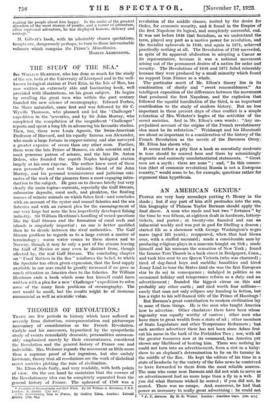THEORIES OF REVOLUTION.t
THERE are few periods in history which have suffered so severely from distortion, misrepresentation and picturesque inaccuracy of consideration as the French Revolution. Carlyle and his successors, hypnotized by the sympathetic study of events remarkably dramatic, personalities unreason- ably emphasized merely by their circumstances, considered the Revolution and the general history of France one and indivisible. Mrs. Webster-regards the movement as little more than a supreme proof of her ingenious, but also unduly histrionic, theory that all revolutions are the work of diabolical secret societies plotting the ruin of civilization.
Mr. Elton deals fairly, and very readably, with both points of view. On the one hand he maintains that the essence of the Revolutionary idea can be completely separated from the general history of France. The upheaval of 1789 was a • Founders of Oceanography and their Work. lty Sir William A. Herdman, P.R.S. London: E. Arnold. [21s. net.] t The Revolutionary Idea in France, By Godfrey EJton, London: Edward Arnold, 110s, Odd revolution of the middle classes, incited by the desire for Order, for economic security, and it found in the Empire of the first Napoleon its logical, and completely successful, end. It was not before 1848 that Socialism, as we understand the term, played any part as a motive power for revolution, and the Socialist upheavals in 1848, and again in 1871, achieved practically nothing at all. The Revolution of 1789 succeeded, in spite of its apparent abdication in adopting a Caesar as its representative, because it was a national movement arising out of the permanent desires of a nation for order and security. The Revolutions of 1848 and 1871 failed miserably because they were produced by a small minority which found no support from France as a whole.
The particular merit of Mr. Elton's theory lies in its combination of clarity and "sweet reasonableness." An intelligent exposition of the differences between the movement that produced the first Napoleon, and the explosion that followed the squalid humiliation of the third, is an important contribution to the study of modem history. But no less important in these present days of class conflict is a simple refutation of Mrs. Webster's bogies of the activities of the secret societies. And in Mr. Elton's own words : "Any un- prejudiced account of the origins of the French revolutionary idea must be its refutation." Weishaupt and his Illuminati are about as important to a consideration of the history of the French Revolution as the novels of the Baroness Orczy.' Mr. Elton has shown why.
It seems rather a pity that a book so essentially moderate in tone should be marred here and there by astonishingly dogmatic and curiously unsubstantiated statements. "Great men are a myth : there are none " ; and, "In this connec- tion (that of economic revolution) Russia is not a European country," would seem to be, for example, questions rather for argument than hypothesis.


























































 Previous page
Previous page